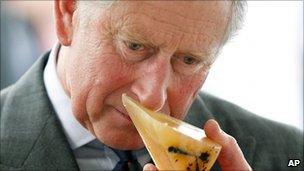Prince Charles, the climate change campaigner
- Published

Prince Charles is determined to make a difference
Prince Charles is visiting cities across the UK as part of a "green tour" to promote sustainable living. He has a message he believes must be heard and won't be deflected by any passing criticism, the BBC's Nicholas Witchell reports.
He looked completely at ease and fully engaged.
This was Prince Charles, heir to the British throne, but more to the point on this occasion, here was Charles, the committed campaigner.
He was launching the most concerted campaign with which he has been involved.
It is called Start and it is about sustainable living.
"It's unprecedented," said someone who has known the prince and been involved in his environmental campaigns for many years.
For a week, Prince Charles is moving from city to city across Britain promoting the cause of sustainable living - that is, essentially, the need for all of us to make a contribution to reducing carbon emissions and to living in a way which is more in balance with the world.
"What I hope to get across," the prince told the assembled environmental enthusiasts - and a number of passing rail passengers - when he launched the drive at Glasgow Central Station, "is that however awful the predicament we face with climate change, and the unsustainable use of the resources that keep us alive, we aren't going to get anywhere by telling everyone what they need to stop doing."
So Start is doing the opposite. It is urging people in Britain to begin taking steps, however small, to protect the environment.
"It is about encouraging and assisting everyone to take the first steps towards the world that we all want to live in: a clean, healthy, energy-efficient world that lives within the limits of its natural resources," the prince said.
And with that he went off to talk to groups who, among other things, grow their own vegetables on allotments, prefer the bicycle to the car, and who champion the habit of recycling.
Royal interventions
The Start campaign is the latest and most intense manifestation of Prince Charles's determination to make a difference and to stand up for issues in which he believes, in some cases passionately.
Over the years, the list of the prince's interventions has become a long one: on architecture (remember the recent Chelsea Barracks planning case?); on GM crops (to which he is vehemently opposed, much to the annoyance of ministers in the last government); on teaching styles and standards (especially English: he favours a more traditional approach); on alternative medicine (he is a champion of homeopathy), and so on.
He does not shrink from sending his hand-written "black-spider" letters (a reference to his rather large, looping script) to government ministers. The language may be circumspect but the tone is insistent and the impact, as he well knows, is often unsettling to the recipients.
So, is this an appropriate way for the future British head of state to behave, most especially since he has come to his position by virtue simply of his birth rather than as a result of any process of public approbation or choice?
The prince's supporters would say emphatically that it is.
They would say that, as heir to the throne, he is in a unique position, disconnected from day-to-day politics, but with a deep and long-term interest in the well-being of the United Kingdom and the global community of which Britain is part.
They would say that it is greatly to his credit that he has attempted to make use of his birthright to do something positive and useful.
Jonathan Porritt, former director of Friends of the Earth and a friend and ally of the prince on environmental matters for 30 years, says that it is wrong to see the prince's work on the environment as, in any sense, overtly "political".
"He would see this as advocacy," he told me. "This is a set of beliefs he's got that doesn't fall into a particular party political camp. Sometimes you need leadership from outside the political context, and that is what he tries to offer."
The prince knows that sometimes his actions irritate politicians. He knows too that sometimes - perhaps often (though less than used to be the case) - he will be gently derided as a rich and privileged man pursuing his various hobby-horses.
Perhaps the former Labour government minister and political diarist Chris Mullin puts his finger on it. As he told me: "The prince does have to watch it a bit, because he has views on many subjects and occasionally he has strayed over the line."
But overall, Mr Mullin is a supporter of the Prince of Wales and what he is trying to do.
"After all," he told me, "he could have frittered his life away as previous Princes of Wales have done, but he hasn't. He's taken a conscious decision to do something with his life and I think he deserves credit for that."
And maybe that is the essential point. For all his occasional quirkiness, Prince Charles has made it his business to take an interest in the life of Britain and the world and to try to do something to justify the immensely privileged position into which he was born.
On sustainability, someone who knows him well told me, he is like a man with a mission.
He does believe passionately that this is a message which has to be heeded, and he is not going to be deflected from that mission by any passing criticism.
- Published6 September 2010
- Published6 September 2010